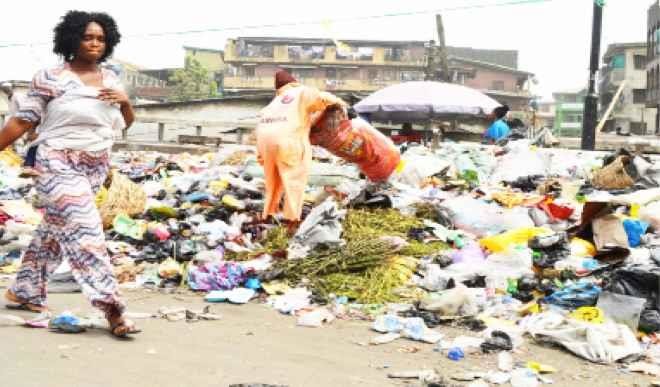An environment report conducted by Clean-Up Nigeria has shown that Kogi, Osun and Nasarawa states remained “the three dirtiest states in the country.”
The 768-page study entitled: “Clean-Up Nigeria National Technical Working Committee Report on the state of the nation’s cleanliness performance ratings for states of the federation, state capitals/cities in Nigeria”, was conducted from October 2017 – October 2018 by 15 members of NTWC.
The organisation, which champions the protection of the environment, also, placed Akwa Ibom, Cross River States, and the Federal Capital Territory as the three neatest states.
According to the report, while Nasarawa scored 12.2 percent, Osun and Kogi states scored 11 percent each.
Others are Akwa Ibom (78.2 percent); Cross River (64 percent) and FCT (58 percent).
The report also revealed that presently, there has been a prevalence of 20 -35 sanitation-related diseases in the country, while over 700 sanitary workers die annually.
While presenting the report during a media briefing in Abuja on Thursday, National Coordinator of CUN and Secretary of NTWC, Prince Ene Baba Owoh Jr, also stated that 175 million Nigerians are living in unclean environments.
According to him, the sanitation/hygiene practices of the people in over 33 states and the FCT call for serious management on the part of the government, individuals and groups.
“We have it as our mandate to mount constructive campaigns through individuals and groups practical actions to better and sustain the quality of the environment and set agenda for a cleaner heritage.
“The release of this study in the state of the nation’s Performance Rating Index for all states of the federation/capital cities, including the six geo-polity al zones of the country is part of CUN’s silver jubilee celebration.
“As confirmed by our study, only three states and state capitals that scored above 50 percent can be considered to be clean. The performance indicators and results have shown that over 175 million Nigerians are living in unclean environments.
“To be very frank with you, sanitation workers are exposed to all hazards through inhalation. Have you been to the dump sites before? You will be amazed. These same gaseous components are part and parcel of the things that the sanitation workers inhale.
“If we talk about the nationwide setting, we are looking at over 700 sanitation workers dying on a yearly basis. In this part of the world when people die, it is believed that witches killed them or they died of poverty,” he said.
Owoh Jr, however, called on the government at all levels to hands-off the direct management of wastes and engage the services of reputable experts in the country to further ensure better service delivery and job creation.

 Join Daily Trust WhatsApp Community For Quick Access To News and Happenings Around You.
Join Daily Trust WhatsApp Community For Quick Access To News and Happenings Around You.


